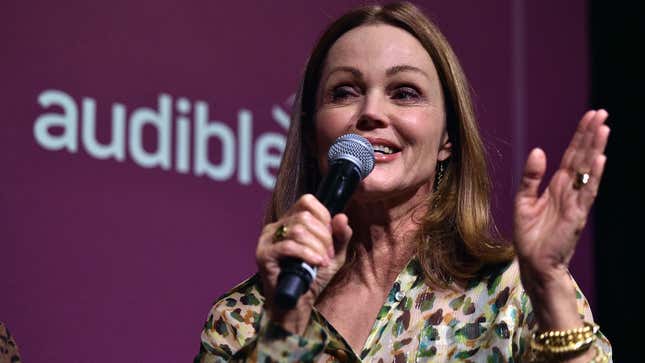I Highly Recommend Listening to Belinda Carlisle's Story of Punk, Pop, Coke, and Recovery
In Depth

One of my favorite things to do at the moment is to listen to celebrities read their memoirs. This would be a pricey habit but for the ability to check them out for free and virtually via the library. I both recommend trying it (I was able to sign up for a Brooklyn Public Library Card online within minutes) and am imploring you not to, as I don’t want you to jump in front of me in line for the hundred or so celebrity memoirs I plan on reading during my long daily pandemic walks. But whatever, I guess it wouldn’t be fair of me to hog all the fun. Walking and listening to celebrities describe their lives (at times, just babbling away, really) is a hobby I picked up as a direct result of quarantine living, but I can’t imagine ever giving it up “when things go back to normal” or whatever they go back to. I’m hooked.
I’ve been consuming celebrity memoirs like Belinda Carlisle apparently did cocaine throughout much of her career. I ingest fat rails of confession and humble-bragging daily. Jessica Simpson’s memoir was amazing and endearing (she cries so much!). Leah Remini’s is great not just as a history of an unorthodox Hollywood career, but as a Scientology exposé. I didn’t like Demi Moore’s much, because I thought it was largely dispassionate—she moved so much as a kid and she talks about Hollywood being like yet another school where she had to figure out the pecking order and navigate it, which is to say that she doesn’t really seem to take seriously her craft. But I guess it was useful for being so revealing, after all. I’m listening to Rosie Perez’s now, and I’m finding it awfully tedious. It’s 11 hours long (the average celebrity audiobook is about seven hours long, in my limited experience) and it’s padded with anecdotes that bespeak a prodigiously photographic memory. Full conversations from her childhood including shifting expressions and body language, complicated emotional trajectories, and exchanges she wasn’t even privy to take up so much space. I’m three hours into it and she’s still 4 years old. Because memory, especially distant memory, doesn’t work in the way that it’s presented in Perez’s book, listening to her makes me dubious (though I do believe the broad strokes of her incredibly difficult and cruel childhood). Mostly it just feels like a waste of time—a lot could have been cut. I love Rosie, so I’m especially disappointed.
Thus far, though, the 2010 memoir by singer Belinda Carlisle, Lips Unsealed, has been my favorite. I always thought she was the coolest—one of my earliest memories is of staring at the cover of her band the Go-Gos’ first album, Beauty and the Beat. I think it’s why, to this day, a woman with a towel wrapped around her head in a clay masque oozes glamor, in my view. In Lips Unsealed, Carlisle tells the story of ascending from a rocky childhood to become a fixture of the L.A. punk scene, and then promptly selling out to go pop once signed. (She reports that it took the album’s widespread popularity to warm her and her bandmates to the more accessible sound they produced on Beauty and the Beat.)
I posted some clips of her reading on my Instagram stories and people rightly pointed out to me that she sounds like Siri. It’s amazing to hear her so prim and proper as to sound virtually robotic while telling stories of total abandon in which hot guys were made out with and piles of cocaine were snorted. She used to have coke FedExed to her from “a guy in a photo lab on Santa Monica Boulevard.”
I mean, she really loved cocaine. “My capacity to party didn’t seem to have any limits,” she reports. Her book shows what she tells.
-

-

-

-

-

-

-

-

-

-

-

-

-

-

-

-

-

-

-

-

-

-

-

-

-

-

-

-

-

-

-

-

-

-

-

-

-

-

-

-








































